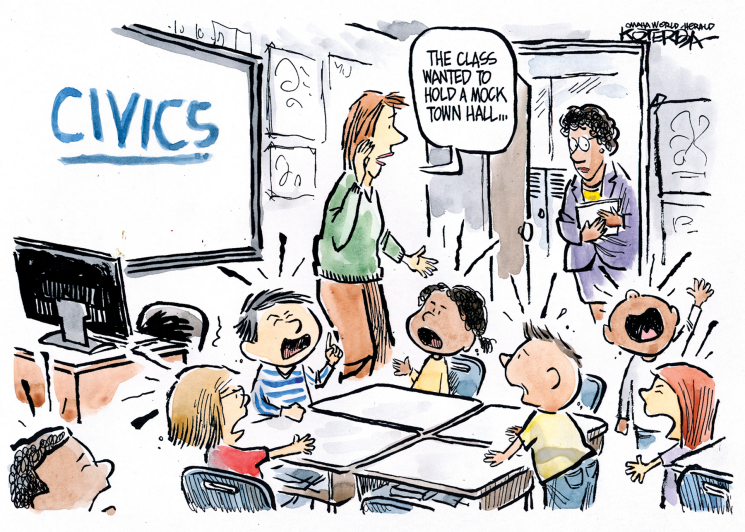A Civics Test to Graduate High School? Absolutely
by Rich Manieri
Spend enough time in the classroom and you learn to read students' faces. They say so much.
"I'm bored." "I'm thinking about something else." "I just broke up with my girlfriend." I'm homesick." "I'm hungry." And, of course, "I have no idea what you're talking about."
The latter - along with the unmistakable sound of crickets - was the reaction to my mention of the day Allied forces invaded Europe in 1944.
This particular encounter with students took place several years ago at another university but I haven't forgotten it. It went something like this.
"So, on D-Day... ."
Nothing.
"Does everyone know what D-Day is?"
Still nothing. Not one hand in the air.
"The invasion of Europe by the Allies?"
Blank stares. "Anyone? Anyone?"
"How about World War II?"
"Oh, yeah!" one student exclaimed, as if we'd made some great breakthrough.
Those few moments in that classroom were indicative of a much broader and very disturbing issue - the appalling knowledge gap among young people about American history and America in general.
A study released earlier this month by the Woodrow Wilson National Fellowship Foundation showed that in a sample of 1,000 American adults, only 36 percent would pass a U.S. citizenship test. Those 65 and older who were surveyed scored the highest. But only 19 percent of those 45 and younger passed the test. Oh yeah, and 60 percent of those surveyed did not know which countries the U.S. fought against in World War II.
If you're not terrified yet, consider that the questions on the test aren't exactly what you would find on the Mensa admissions exam.
Here are a few actual questions on the citizenship test: What does the Constitution do? What is one right or freedom from the First Amendment? Name one branch or part of the government? Who makes federal laws?
You get the idea. Not a lot of heavy lifting.
And yet, at least if this study is any barometer, most Americans would fail a rudimentary civics test.
This would seem to be a searing indictment of our public schools. How a student can graduate high school, not to mention college, knowing virtually nothing about a world war that claimed the lives of 418,500 Americans and 50 million others is stupefying.
But here we are.
Kentucky is the most recent state to require all high school seniors to pass a U.S. citizenship test to graduate. Students have to score a 60 on a 100-question test to pass. Kentucky is one of nine states that require students to pass a civics test to graduate high school.
Bravo.
It's hard to imagine that anyone would object to such a basic requirement but alas, the naysayers are out there. Chief among the pooh poohers, of all things, is the National Council for the Social Studies whose tagline, ironically enough, reads "Preparing Students for College, Career, and Civic Life."
'While the Naturalization Test as presently constructed does assess a surface level of civic knowledge that may be quickly forgotten, it ignores the skills and dispositions component so necessary for true civic literacy and learning," according to an NCSS position statement posted in March, 2018. "Indeed, rote knowledge of civics content does not equal understanding of what it means to be a citizen."
I'm not naive enough to believe that passing a simple civics test to graduate high school is the remedy for the multi-leveled failure to teach our young people the basics of what it means to be an American. But it's something.
I would argue that our elementary and secondary school students would be much better served learning about why America had to fight World War II instead of being taught hogwash such as "School Climate Reform" or "Action Civics."
Every state should pass a law requiring high school students to pass a civics test to graduate. The question, "Who knows about D-Day?" should never be met by unraised hands in any high school or college classroom.But it is. And that's more than a failure. It's a tragedy.
-
Copyright 2018 Rich Manieri, distributed by Cagle Cartoons newspaper syndicate.
Rich Manieri is a Philadelphia-born journalist and author. He is currently a professor of journalism at Asbury University in Kentucky. His book, "We Burn on Friday: A Memoir of My Father and Me" is available at amazon.com. You can reach him at [email protected].